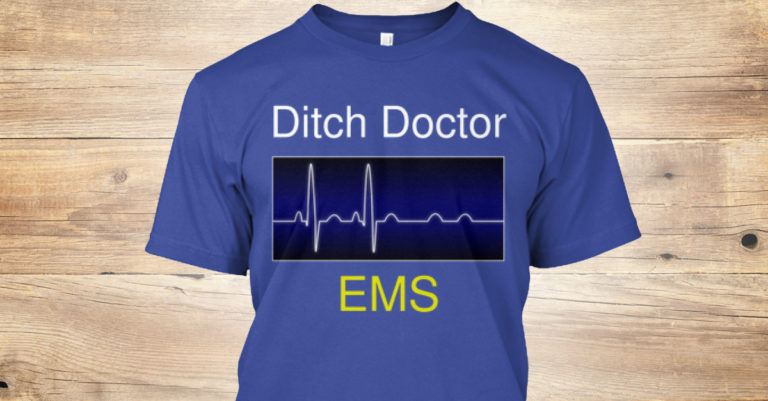
A meme that predates the Internet and goes back at least to the days of “Bulletin Board Services” (BBS) is that paramedics “Do everything that an ER doctor does, but we do it in a ditch on the side of the road.”
To which I say, bullshit.
I don’t know any good paramedic that believes that, not a one. In fact, I don’t know if I know any crappy paramedics that believe that either.
The truth is that paramedics have limited knowledge. Even the best two year Associates Degree programs barely scratch the surface of medical education. An experienced paramedic who spends a lot of time going to classes, reading, and talking with doctors might know more about a few specific illnesses than an intern or junior resident.
That’s not the same as doing (or knowing) everything that an ER doctor does. Not even close
Here is a graphic representation.
Paramedics know this much,

about this much,

about medicine.
Overly confident, but not well educated, paramedics that pose the real threat to paramedics. It’s easy to get in over your head if you “don’t know what you don’t know” as the saying goes.
I was never a “throw everything in the drug box as the patient” type of paramedic. It was drilled into me during my training that it’s easier to do harm than good with many of the medications we carry on ambulances.
Back when we Sort Big City EMS was training up for the use of Rapid Sequence Intubation, one of the doctors who did our lectures reminded us that we used two of the three drugs then utilized for execution by lethal injection.
Think about that for a minute. We had drugs that could render a patient unconscious and chemically paralyze them as part of the process of intubation. If we couldn’t succeed in intubating the patient, then we ran a risk of serious harm.
That was well over 25 years ago and I’ve never forgotten the class or the doctor.
As Clint Eastwood once said,
Of course in cases like this, if we made a mistake, we weren’t the ones that were as risk of dying.
Back to the arrogance of the “Ditch Doctor.”
I never once treated a patient in a ditch, but that’s mostly because I worked in an urban setting and ditches generally didn’t end up with cars in them. Except that one time when a driver managed to drop his car into a ditch being dug for installation of a main sewer line. He wasn’t injured, but his car certainly was.
I did intubate a patient on the first floor of a house that was on fire, but the fire was actually on the second and third floors. The fire department had rescued the patient who had inhaled a large volume of smoke and more solid debris from the fire. A touch intubation, but certainly nothing that an Emergency Physician shouldn’t have been able to do.
At no time did I think to myself that this was some great accomplishment, although the ED physician at the hospital was impressed enough to write a letter commending my partner and me.
The point of all of this is that paramedics should be careful about their bragging. We’re not any sort of doctor, let alone a “Ditch Doctor.” Our job is to keep the patient alive, what I call temporizing, until we can get them to the real doctor.
Very rarely do we “save a life.” That happens, but not often. By my count, and I worked in a very busy system, I responded to one call a month or so where my care made a big difference in the patient’s life. Most of those were either respiratory or trauma related. As to trauma, keeping the patient’s figurative head above water was the goal. Keep them viable enough so that the surgeons could do their magic.
Respiratory patients were people that we could help, but most of the time they didn’t need treatment as much as they needed to be in the hospital. As a BLS co worker used to say, “Transport is part of the treatment.” Sometimes it, along with our observations and reports, was the most important part of the treatment.
As time moved on, that equation changed somewhat towards the treatment end as we got CPAP, better medications, 12 lead EKGs, a better idea of what was important for Strokes and Sepsis. Still, very rarely did we “cure” a patient and eliminated the need for transport.
The good news is that there really is a Ditch Doctor that does things that no ED Physician can do,